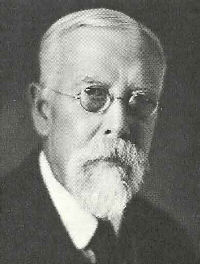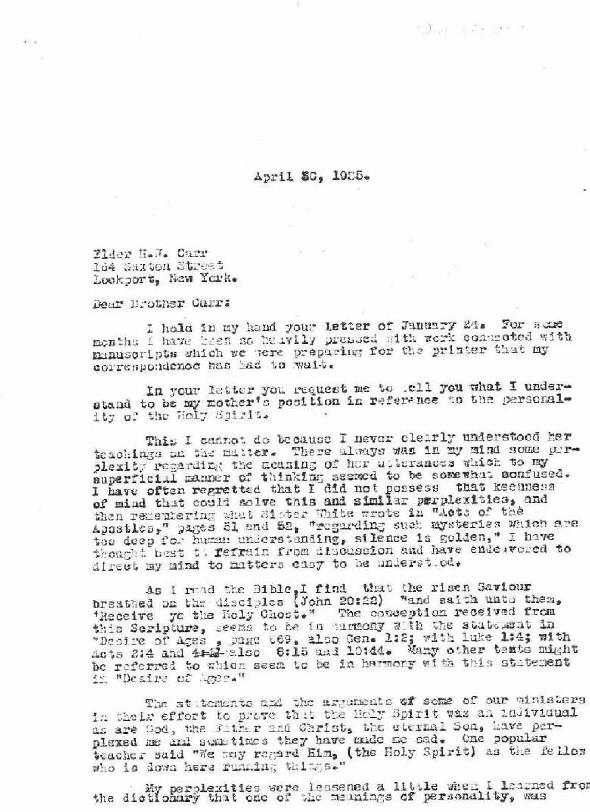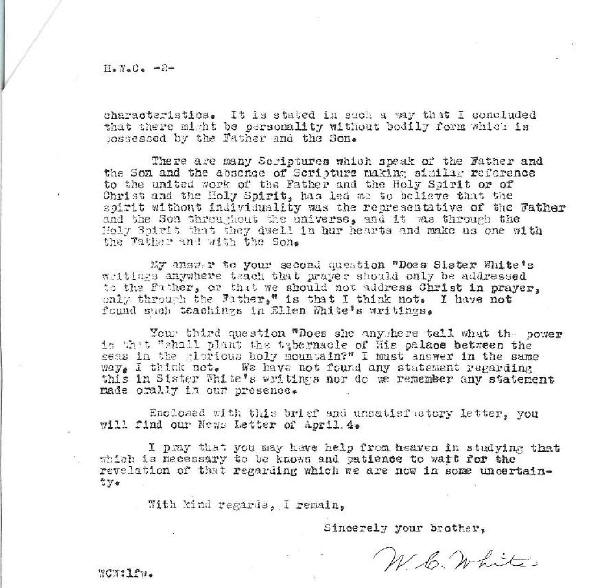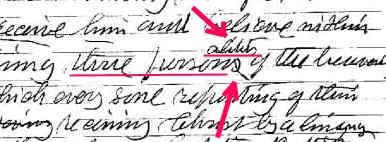 Filho
da Sra. White Não Acreditava na Trindade!
Filho
da Sra. White Não Acreditava na Trindade!
"Willie" Sugeriu que os Escritos Dela Fossem Comparados com a Bíblia
A carta que você vê traduzida abaixo foi escrita por Guilherme C. White em 30 de abril de 1935. A versão original dela está no White Estate da Associação Geral, onde o irmão Ennis Meier providenciou a cópia mostrada também abaixo, logo depois da tradução da carta:
30 de Abril de 1935
Pastor H. W. Carr Caro Irmão Carr: Tenho em minhas mãos sua carta de 24 de Janeiro. Por alguns meses, tenho estado tão pressionado com o trabalho relacionado aos manuscritos que estamos preparando para imprimir, que minha correspondência teve que esperar. Em sua carta, você me pede para contar o que entendo ser a posição de minha mãe em relação à personalidade do Espírito Santo. Isso eu não posso fazer porque eu nunca entendi claramente seus ensinos sobre esse assunto. Sempre houve em minha mente alguma confusão a respeito do significado das expressões dela que, para a minha forma de raciocinar, parecem ser um pouco confusas. Freqüentemente tenho lamentado não possuir a capacidade mental que poderia resolver esta e outras perplexidades semelhantes, e então, relembrando o que a irmã White escreveu nos "Atos dos Apóstolos", págs. 51 e 52 a "respeito dos mistérios que são muito profundos para a compreensão humana, o silêncio é ouro". Tenho achado melhor me refrear desta discussão e me esforçar para dirigir minha mente a assuntos fáceis de serem compreendidos. Enquanto eu lia a Bíblia, eu encontrei que o Salvador ressurreto soprou nos discípulos (João 20:22) e disse a eles "Recebei o Espírito Santo". O conceito gerado através deste texto das Escrituras parece estar em harmonia com a declaração do "Desejado de Todas as Nações", pag. 669, também Gênesis 1:2; com Lucas 1:4; com Atos 2:4; 4:12; 8:15; 10:44. Muitos outros textos poderiam ser citados e que parecem estar em harmonia com esta declaração do "Desejado de Todas as Nações". As declarações e os argumentos de alguns dos nossos ministros em seu esforço para provar que o Espírito Santo era um indivíduo como é Deus, o Pai e Cristo, o eterno Filho, têm me deixado perplexo e algumas vezes eles me tem entristecido. Um mestre popular disse: "Podemos considerá-Lo (O Espírito Santo) como o companheiro que está aqui embaixo fazendo as coisas acontecerem." Minhas perplexidades foram minimizadas quando aprendi, no dicionário, que um dos significados de "personalidade" era
|
|
|
características. Isto está declarado de tal forma que eu concluí que pode haver personalidade sem uma forma corpórea a qual o Pai e o Filho possuem. Há muitos textos das Escrituras que falam do Pai e do Filho e a falta de textos que fazem referência similar ao trabalho unido do Pai e o Espírito Santo ou Cristo e o Espírito Santo me tem feito acreditar que o espírito sem individualidade era o representante do Pai e do Filho através do universo, e vem sendo através do Espírito Santo que eles habitam em nossos corações e nos fazem um com o Pai e com o Filho. Minha resposta para a segunda pergunta "Em algum lugar, os escritos da Irmã White ensinam que a oração deve ser dirigida unicamente ao Pai, ou que nós não nos devemos dirigir a Cristo em oração, somente ao Pai", eu penso que não. Eu não encontrei este ensino nos escritos de Ellen White. Sua terceira pergunta "Ela, em algum lugar, diz qual é o poder que "armará as tendas do seu palácio entre o mar grande e o glorioso monte santo". Devo responder da mesma forma. Acho que não. Não encontramos nenhuma declaração sobre isso nos escritos da irmã White nem nos lembramos de nenhuma declaração feita verbalmente em nossa presença. Junto com essa breve carta você encontrará nosso periódico (News Letter) de 4 de Abril. Eu oro para que voce possa receber ajuda dos céus no estudo daquilo que é necessário saber e paciência para esperar por uma revelação a respeito daquilo que hoje é incerto para nós. Saudações Cordiais do seu irmão.
W. C. White WCW: lfv.
|
Cópia do texto original:


Comentários de Ennis Meier:
Hoje (8 de Julho de 2003) passamos na Conferência Geral e conseguimos no White Estate a cópia assinada dessa carta, datada de 1935, de William, chamado Guilherme (em português), White.
Essa cópia não foi obtida de microfilmes, ou de outra
cópia, mas do documento original com a assinatura real de W.C. White, como se vê
embaixo, em papel fino próprio para cópia datilográfica.
Respondendo a uma carta, William White revela sua perplexidade diante de escritos
atribuídos a sua mãe, que não lhe eram absolutamente familiares. Provavelmente, não se
tratavam de escritos enviados para publicação, mas simples anotações, numa época que não
havia fotocopiadoras e poderiam muito bem ser de outros autores. Isto é, poderiam haver
alguns rascunhos verdadeiros e outros falsos.
Embora não tenha se referido diretamente à mudança doutrinária de 1931, estão implícitos
nessa carta o desgosto e a perplexidade de William C. White em relação a essa mudança.
A carta provavelmente responde a perguntas sobre um rascunho manuscrito, em que Ellen White primeiro escreveu "person" e depois corrigiu para "personalities". Veja que ela cortou o "s" e acrescentou "alities":

No Alvorada.Us, temos mais detalhes
sobre esse outro documento. (Clique!)
Mas podemos dizer que é um manuscrito, mas que não passa de uma simples anotação ou
rascunho e não foi material enviado para publicação, foi posteriormente transcrito em
livro. Porém, astutamente, sem a correção sugerida por Ellen White.
Daí a importância desse testemunho de William White em meados da década de 1930, pois, além de filho e herdeiro, era o secretário particular de Ellen White e trabalhou com ela durante várias décadas.
A pergunta inicial formulada
pelo destinatário da carta, a quem William White evita falar em nome de sua mãe, é sobre a
"personalidade" do Espírito Santo como individualidade. Obviamente, William White quase
nada sabia sobre isso, bem como sua mãe. Isso porque a Bíblia quase nada revela sobre a
natureza do Espírito Santo. Assim, Willie repete apenas o que sua mãe escrevera, que
"acerca da natureza do Espírito Santo, o silêncio é ouro".
Curiosamente, vemos hoje a administração enfatizando a necessidade de silêncio sobre o
tema, mas só depois de garantir que o Espírito Santo é uma pessoa e igual a Deus, coisas
que a Bíblia não revela e diz exatamente ao contrário. "Há um só Deus, o Pai, e um só Senhor, Jesus Cristo." Pode
haver erro ou má compreensão quanto a isso? Ou há alguma declaração mais clara sobre esse
assunto do que essa?
Sem dúvida, Guilherme White é a mais importante testemunha ocular na controvérsia da Trindade na Igreja Adventista! Essa carta pode provar inclusive que alguns textos do livro Evangelismo sobre a Trindade, lançado em 1946, são falsos. Pois é o filho de Ellen G. White, uma testemunha idônea e respeitada, como já dissemos, mas que põe a autenticidade de alguns documentos em dúvida.
William White foi muito prudente em sua carta, ao não querer falar em nome da sua mãe. E é também muito importante que tenha manifestado sua estranheza diante de idéias veiculadas por rascunhos de manuscritos ou supostas declarações, que começaram a circular logo depois da morte de Ellen White.
Pelo fato de ter sido secretário particular de Ellen White durante muitas décadas, é muito significativo que proteste, apresentando sua inconformidade diante de um cenário que desconhecia.
A subjetividade dessa prova não
é menos importante do que os
10 Year Books também já
documentados e apresentados por nós, os quais mostram que nos seus últimos 25 anos,
Ellen White conviveu com o não-trinitarianismo como doutrina oficial da igreja e nunca
disse uma palavra de reprovação contra esse posicionamento.
Surpreendo-me às vezes com a abertura e liberdade nas minhas pesquisas no White Estate
da Conferência Geral e no próprio Arquivo da Conferência Geral. Literalmente, até
agora as portas tem estado abertas e tenho tido toda a cooperação possível. Já fui
dezenas de vezes pesquisar no White Estate e no Arquivo da Conferência Geral.
Para achar essa carta de William White foi preciso procurar mais de meia hora e houve um grande empenho para encontrá-la, por parte da diretoria do White Estate. Tanto o Mr. Tim Poirier (atual vice-diretor do White Estate), como o Diretor do Arquivo Bert Haloviak, têm sido muito amáveis e estão sempre muito empenhados em conseguir os documentos solicitados.
Mostrei ao Diretor do Arquivo da Conferência Geral várias páginas do www.alvorada.us e lhe oferecí um CD com todo o website. O Mr. Bert ofereceu até colocar um link do alvorada.us no website do Arquivo da Conferência Geral. Alertei-lhe que o website continha material polêmico e poderia comprometer, mas me respondeu que o fato de ter material polêmico, não seria nenhum inconveniente.
A cópia dessa carta de William C. White poderia ser conseguida no White Estate do IAE-2, se no Brasil não estivessem a fim de esconder as cópias que certamente têm de tudo que existe na Old Columbia Pike, White Estate, Conferência Geral, USA. -- Ennis Meier.
Transcrição do original da carta (em inglês) para conferência da tradução:
April 30, 1935
Elder H. W. Carr
164 Saxton Street
Lookport, New York.
Dear Brother Carr:
I hold in my hand your letter of January 24. For some month I have so heavily pressed with work connected with manuscripts which we were preparing for the printer that my correspondence has had to wait.
In your letter you request me to tell you what I understand to be my mother's position in reference to the personality of the Holy Spirit.
This I cannot do because I never clearly understood her teachings on the matter. There always was in my mind some perplexity regarding the meaning on her ulterances which to my superficial manner of thinking seemed to be somewhat confused. I have often regretted that I did not possess that keenness of mind that could solve this and smiliar perplexities, and then remembering what Sister White wrote in "Acts of the Apostles," pages 51 and 52, "regarding such mysteries which are too deep for human understanding, silence is golden," I have thought best to refrain from discussion and have endeavored to direct my mind to matters easy to be understood.
As I read the Bible, I find that the risen Saviour breathed on the disciples (John 20:22) "and saith to them 'Receive ye the HOly Ghost." The conception received from this Scripture, seems to be in harmony with the statement in "Desire of Ages", page 669, also Gen, 1:2; with Luke 1:4; with Acts 2:4 and 4:12 also 8:15 and 10:44. Many other texts might be referred to which seem to be in harmony with this statement of "Desire of Ages."
The statements and the arguments of some of our ministers in their effort to prove that the Holy Spirit was an individual as are God, the Father and Christ, the eternal Son, have perplexed me and sometimes they have made me sad. One popular teacher said "We may regard Him, (The Holy Spirit) as the fellow who is down here running things."
My perplexities were lessened a little when I learned from the dictionary that one of meanings of personality, was characteristics. It is stated in such a way that I concluded that there might be personality without bodily form which is possessed by the Father and the Son.
There are many Scriptures which speak of the Father and the Son and the absence os Scripture making similar reference to the united work of the Father and the HOly Spirit or Christ ande the Holy Spirit, has led me to believe that the spirit without individuality was the representative of the Father and the Son throughout the universe, and it was (has?) through the Holy Spirit that they dwell in our hearts and make us onde with the Father and with the Son.
My answer to your second question "Does Sister White's writings anywhere teach that prayer should only be addressed to the Father, or that we should not address Christ in prayer, only throught the father," is that I think no. I have not found such teachings in Ellen White's writings.
Your third question "Does she anywhere tell what the power is that "shall plant tabernacule of His palace between the seas in the glorius holy mountain" I must answer in the same way. I think not. We have not found any statement regarding this in Sister Whites's writings nor do we remember any statement made orally in our presence.
Enclosed with this brief and unsatisfavtory letter, you will find our News Letter of Abril 4.
I pray that you may have help from heaven in studying that which is necessary to be known and patience to wait for the revelation of that regarding which we are now in some uncertainly.
With kind regards, I remain,
Sincerely your brother,
W. C. White
WCW: lfv.